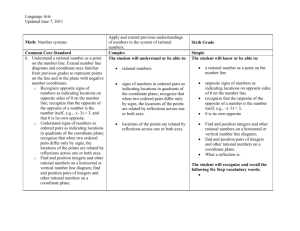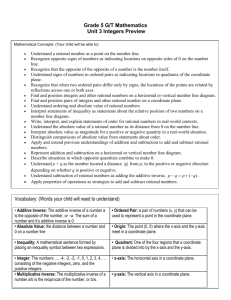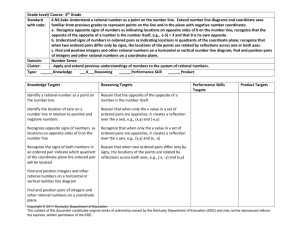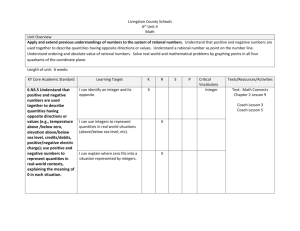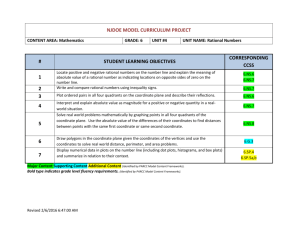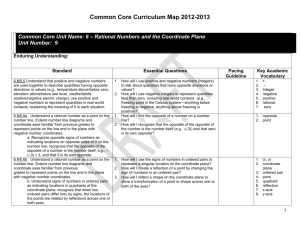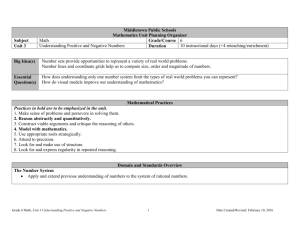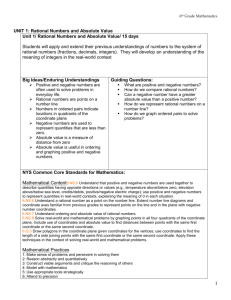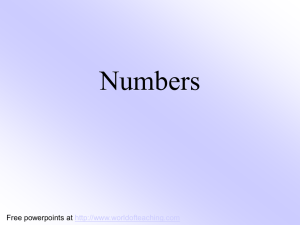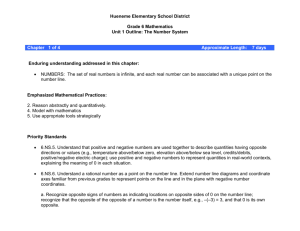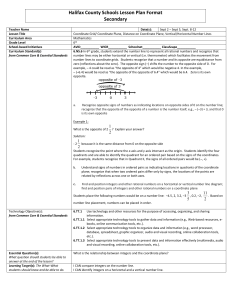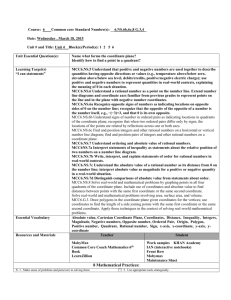Instructional Block 9
advertisement
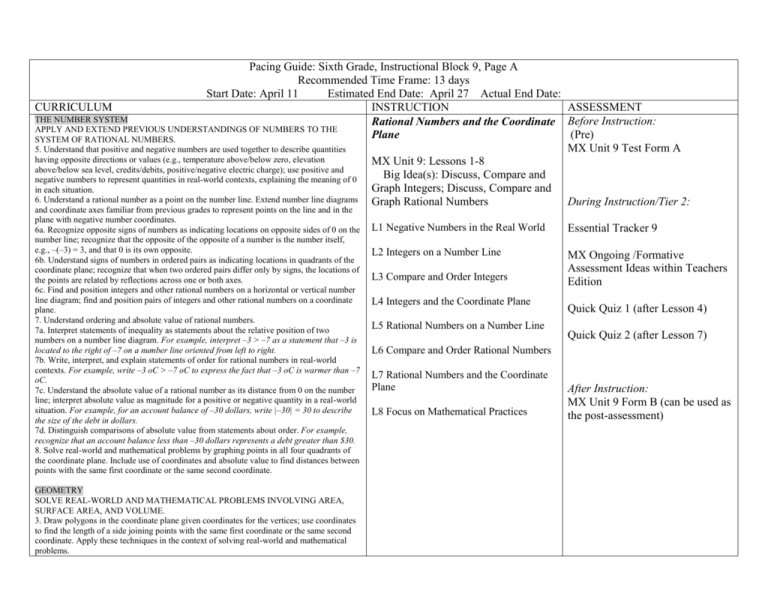
Pacing Guide: Sixth Grade, Instructional Block 9, Page A Recommended Time Frame: 13 days Start Date: April 11 Estimated End Date: April 27 Actual End Date: CURRICULUM INSTRUCTION ASSESSMENT THE NUMBER SYSTEM Rational Numbers and the Coordinate Before Instruction: APPLY AND EXTEND PREVIOUS UNDERSTANDINGS OF NUMBERS TO THE (Pre) Plane SYSTEM OF RATIONAL NUMBERS. MX Unit 9 Test Form A 5. Understand that positive and negative numbers are used together to describe quantities having opposite directions or values (e.g., temperature above/below zero, elevation MX Unit 9: Lessons 1-8 above/below sea level, credits/debits, positive/negative electric charge); use positive and Big Idea(s): Discuss, Compare and negative numbers to represent quantities in real-world contexts, explaining the meaning of 0 Graph Integers; Discuss, Compare and in each situation. 6. Understand a rational number as a point on the number line. Extend number line diagrams Graph Rational Numbers During Instruction/Tier 2: and coordinate axes familiar from previous grades to represent points on the line and in the plane with negative number coordinates. 6a. Recognize opposite signs of numbers as indicating locations on opposite sides of 0 on the number line; recognize that the opposite of the opposite of a number is the number itself, e.g., –(–3) = 3, and that 0 is its own opposite. 6b. Understand signs of numbers in ordered pairs as indicating locations in quadrants of the coordinate plane; recognize that when two ordered pairs differ only by signs, the locations of the points are related by reflections across one or both axes. 6c. Find and position integers and other rational numbers on a horizontal or vertical number line diagram; find and position pairs of integers and other rational numbers on a coordinate plane. 7. Understand ordering and absolute value of rational numbers. 7a. Interpret statements of inequality as statements about the relative position of two numbers on a number line diagram. For example, interpret –3 > –7 as a statement that –3 is located to the right of –7 on a number line oriented from left to right. 7b. Write, interpret, and explain statements of order for rational numbers in real-world contexts. For example, write –3 oC > –7 oC to express the fact that –3 oC is warmer than –7 oC. 7c. Understand the absolute value of a rational number as its distance from 0 on the number line; interpret absolute value as magnitude for a positive or negative quantity in a real-world situation. For example, for an account balance of –30 dollars, write |–30| = 30 to describe the size of the debt in dollars. 7d. Distinguish comparisons of absolute value from statements about order. For example, recognize that an account balance less than –30 dollars represents a debt greater than $30. 8. Solve real-world and mathematical problems by graphing points in all four quadrants of the coordinate plane. Include use of coordinates and absolute value to find distances between points with the same first coordinate or the same second coordinate. GEOMETRY SOLVE REAL-WORLD AND MATHEMATICAL PROBLEMS INVOLVING AREA, SURFACE AREA, AND VOLUME. 3. Draw polygons in the coordinate plane given coordinates for the vertices; use coordinates to find the length of a side joining points with the same first coordinate or the same second coordinate. Apply these techniques in the context of solving real-world and mathematical problems. L1 Negative Numbers in the Real World Essential Tracker 9 L2 Integers on a Number Line MX Ongoing /Formative Assessment Ideas within Teachers Edition L3 Compare and Order Integers L4 Integers and the Coordinate Plane L5 Rational Numbers on a Number Line Quick Quiz 1 (after Lesson 4) Quick Quiz 2 (after Lesson 7) L6 Compare and Order Rational Numbers L7 Rational Numbers and the Coordinate Plane L8 Focus on Mathematical Practices After Instruction: MX Unit 9 Form B (can be used as the post-assessment)
